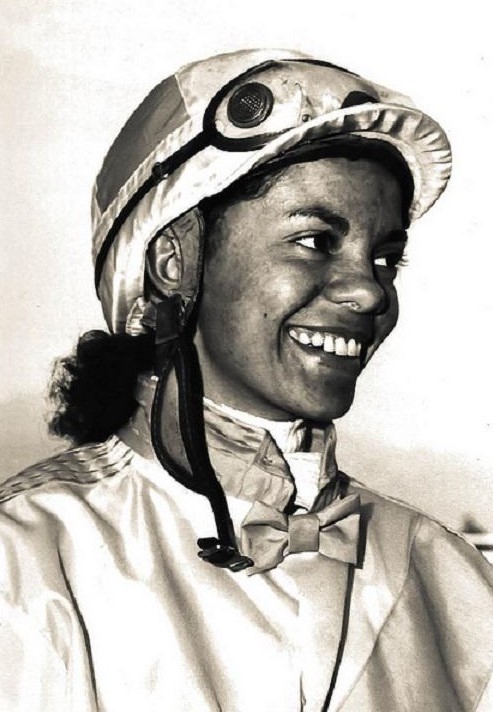Cheryl White is the nation’s first black female horse jockey. White was born on October 29, 1953, in Cleveland, Ohio. Her father, Raymond White, was an African American horse trainer, and her mother, Doris, was a Polish American racehorse owner. The family owned 80 acres of land in Rome, Ohio, and several thoroughbred horses. White began riding when she was four years old, when she told her father she wanted to become a jockey. She was the first female to apply for a jockey license at Thistledown Racetrack in Cleveland, where she regularly trained with her parents. She attended Grand Valley High School in nearby Orwell, Ohio, and graduated in 1971 soon after being awarded an academic scholarship to Bowling Green State University.
White made history in her first official race on June 15, 1971. She rode her father’s horse, Ace Reward, and although she started first, she finished in last place out of 11 riders. On July 29, 1971, White appeared on the cover of Jet magazine. She was interviewed during her third career race, riding Othello’s Treasure. White placed third her race but was quickly disqualified for mishandling her horse at the start of the race and crossing lines in front on another rider. She was then sent for two additional weeks of training focused on running horses from the starting gate. White earned $35 every time she mounted a horse for a race and kept 10% of her horse’s earnings each time she placed first.
On September 2, 1971, at the age of 17, White became the first African American female jockey to win a thoroughbred race. Her victory came at Waterford Park, Chester, West Virginia. In the same month, she became the first Black woman to win two races on the same day in two separate states, winning both at Thistledown in Ohio, and then at Waterford in West Virginia later that day. White was invited to the prestigious all ladies “Boots and Bows Handicap” race in Atlantic City, New Jersey, on August 28, 1972, and won first place out of 14 riders.
White relocated to California in 1974 and entered the riding scene at state and county fairs. She was the first woman to win the Appaloosa Horse Club’s Jockey of the Year award in 1977, and consecutively from 1983 to 1985. On October 19, 1983, White made history again, winning five races in one day at the Fresno Fair in Central California. She was the leading Appaloosa rider in the United States for five consecutive years, but she also rode thoroughbred, quarter horses, paint, and Arabian horses.
In 1990, White was presented an Award of Merit from the African American Sports Hall of Fame in Sacramento, as well as the Sports Award and Award of Merit from the California Legislature. She passed the California Horse Racing Board Steward Examination in 1991 and became the first female steward at a California racetrack. She then began working as a racing official, officially retired from riding in 1992. In 1994, White received the Successful African Americans in the Thoroughbred Racing Industry Award from the Bluegrass Black Business Association in Lexington, Kentucky.
White died on September 20, 2019, at the age of 65, at her home in Youngstown, Ohio. A memorial was held at Thistledown, where she ran her first race. She is survived by her brother Raymond White Jr, and numerous nieces and nephews.
Do you find this information helpful? A small donation would help us keep this available to all. Forego a bottle of soda and donate its cost to us for the information you just learned, and feel good about helping to make it available to everyone.
BlackPast.org is a 501(c)(3) non-profit and our EIN is 26-1625373. Your donation is fully tax-deductible.
Tina Hines, “Jockey Cheryl White, An American Missed”, March 18, 2007, Horse-races.net, http://www.horse-races.net/library/article-cherylwhite.htm; Bloodhorse Staff, “Lady Legends return to Pimlico”, May 18, 2011, Bloodhorse.com, https://www.bloodhorse.com/horse-racing/articles/136238/lady-legends-return-to-pimlico.
Your support is crucial to our mission.
Donate today to help us advance Black history education and foster a more inclusive understanding of our shared cultural heritage.

